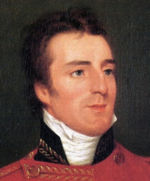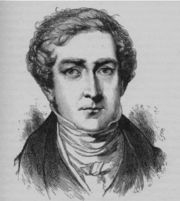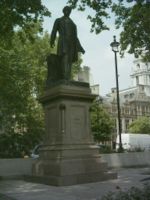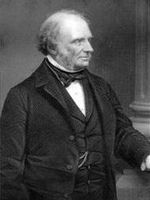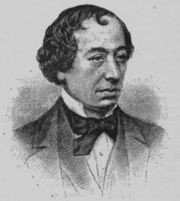Robert Peel
2007 Schools Wikipedia Selection. Related subjects: British History 1750-1900
| The Rt Hon Sir Robert Peel, Bt | |
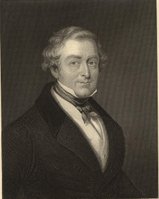 |
|
|
|
|
| In office December 10, 1834 – April 8, 1835 August 30, 1841 – June 29, 1846 |
|
| Preceded by | The Viscount Melbourne |
|---|---|
| Succeeded by | The Viscount Melbourne The Lord John Russell |
|
Chancellor of the Exchequer
|
|
| In office December 2, 1834 – April 8, 1835 |
|
| Preceded by | Thomas Denman |
| Succeeded by | Thomas Spring Rice |
|
|
|
| Born | 5 February 1788 Bury, Lancashire, England |
| Died | 2 July 1850 (age 62) Westminster, London, England |
| Political party | Conservative |
Sir Robert Peel, 2nd Baronet ( 5 February 1788 – 2 July 1850) was the Conservative Prime Minister of the United Kingdom from December 10, 1834 to April 8, 1835, and again from August 30, 1841 to June 29, 1846. He helped create the modern concept of the police force while Home Secretary, oversaw the formation of the Conservative Party out of the shattered Tory Party, and repealed the Corn Laws.
Biography
Peel was born in Bury, Lancashire, England to the industrialist and Member of Parliament Sir Robert Peel. His father was one of the richest textile manufacturers of the early Industrial Revolution. Peel was educated first at Hipperholme Grammar School, then at Harrow School and finally Christ Church, Oxford, where he took a double first in classics and mathematics. He is also believed to have briefly attended Bury Grammar School. While living in Tamworth, he is credited with the development of the Tamworth Pig by breeding Irish stock with some local Tamworth pigs. He has living relatives even today, as far as Australia, and the Peel family living in Victoria.
Early political career
The young Peel entered politics at the young age of 21 as MP for the Irish rotten borough of Cashel City, Tipperary. With a scant twenty-four voters on the rolls, he was elected unopposed. More importantly, his sponsor for the election (besides his father) was Sir Arthur Wellesley, the future Duke of Wellington, with whom Peel's political career would be entwined for the next twenty-five years.
His maiden speech in the Commons was a sensation, and was famously described by the Speaker as "the best first speech since that of William Pitt".
For the next decade he occupied a series of relatively minor positions in the Tory governments: Undersecretary for War, Chief Secretary for Ireland, and chairman of the Bullion Committee (charged with stabilizing British finances after the end of the Napoleonic Wars). He also changed seats twice: first picking up another rotten borough, Chippenham, then becoming MP for Oxford University in 1817.
He later served as MP for Tamworth from 1830 until his death. His home was Drayton Manor. His home Drayton Manor is no longer standing, but it is home to Drayton Manor Theme Park.
Home secretary
Peel was considered one of the rising stars of the Tory party, first entering the cabinet in 1822 as Home Secretary. As Home Secretary, he introduced a number of important reforms of British criminal law: most memorably establishing the Metropolitan Police Force (Metropolitan Police Act 1828). He also changed the Penal code reducing the number of crimes punishable by death. He reformed the gaol system, introducing payment for gaolers and education for the inmates.
He resigned as Home Secretary after the Prime Minister, Lord Liverpool, became incapacitated and was replaced by George Canning. Canning favoured Catholic Emancipation, while Peel had been one of its most outspoken opponents. Canning himself died less than four months later and, after the brief premiership of Lord Goderich, Peel returned to the post of Home Secretary under the premiership of his long-time ally the Duke of Wellington. During this time he was widely perceived as the number-two in the Tory Party, after Wellington himself.
However, the pressure on the new ministry from advocates of Catholic Emancipation was too great and an Emancipation Bill was passed the next year. Peel felt compelled to resign his seat as MP representing the graduates of Oxford University (many of whom were Anglican clergymen), as he had stood on a platform of opposition to Catholic Emancipation (in 1815 he had, in fact, challenged to a duel the man most associated with emancipation, Daniel O'Connell). Peel instead moved to a rotten borough, Westbury, retaining his Cabinet position. Peel's protege Gladstone later emulated Peel by serving as MP for Oxford University from 1847 to 1865, before himself being defeated for his willingness to disestablish the Irish Church.
Police Reform
It was at this point that he established Metropolitan Police Force for London based at Scotland Yard. The 1,000 constables employed were affectionately nicknamed 'Bobbies' or, somewhat less affectionately, 'Peelers' (both terms are still used today). Although at first unpopular, they proved very successful in cutting crime in London, and by 1835 all cities in the UK were being directed to form their own police forces—see Policing in the United Kingdom. (Actually, the authorities in Stalybridge, Cheshire had set up their own police force some two years earlier and so Peel was aware of this success of "police forces" before he "introduced" them in London. The city of Glasgow, Scotland had also had its own police force since 1800.) Known as the father of modern policing, Robert Peel developed the Peelian Principles which defined the ethical requirements police officers must follow in order to be effective. His most memorable principle was, "the police are the public, and the public are the police."
- The basic mission for which the police exist is to prevent crime and disorder.
- The ability of the police to perform their duties is dependent upon public approval of police actions.
- Police must secure the willing co-operation of the public in voluntary observance of the law to be able to secure and maintain the respect of the public.
- The degree of co-operation of the public that can be secured diminishes proportionately to the necessity of the use of physical force.
- Police seek and preserve public favour not by catering to public opinion but by constantly demonstrating absolute impartial service to the law.
- Police use physical force to the extent necessary to secure observance of the law or to restore order only when the exercise of persuasion, advice and warning is found to be insufficient.
- Police, at all times, should maintain a relationship with the public that gives reality to the historic tradition that the police are the public and the public are the police; the police being only members of the public who are paid to give full-time attention to duties which are incumbent on every citizen in the interests of community welfare and existence.
- Police should always direct their action strictly towards their functions and never appear to usurp the powers of the judiciary.
- The test of police efficiency is the absence of crime and disorder, not the visible evidence of police action in dealing with it.
Whigs in power (1830-1834)
The lower classes in England at that time, however, were clamoring for reform, and Catholic Emancipation was only one of the ideas in the air. The Tory ministry refused to bend on other issues and were swept out of office in 1830 in favour of the Whigs. The following few years were extremely turbulent, but eventually enough reforms were passed that King William IV felt confident enough invite the Tories again to form a ministry in succession to those of Lord Grey and Lord Melbourne in 1834. Peel was selected as Prime Minister but was in Italy at the time, so Wellington acted as a caretaker for the three weeks until Peel's return.
First term as Prime Minister (1834-1835)
This new Tory Ministry was a minority government, however, and depended on Whig goodwill for its continued existence. As his statement of policy at the general election of January 1835, Peel issued the Tamworth Manifesto. The issuing of this document is often seen as one of the most crucial points at which the Tories became the Conservative Party. In it he pledged that the Conservatives would endorse modest reform, but the Whigs instead formed a compact with Daniel O'Connell's Irish Radical members to repeatedly defeat the government on various bills. Eventually Peel's ministry resigned out of frustration and the Whigs under Lord Melbourne returned to power. The only real achievements of Peel's first administration was a commission to review the governance of the Church of England. This ecclesiastical commission being the forerunner of the Church Commissioners. A further achievement was a rapid gain in seats in the House of Commons which was around 100 seats in the 100 days Peel's Ministry lasted.
Leader of the Opposition (1835-1841)
In May 1839, he was offered another chance to form a government, this time by the new monarch, Queen Victoria. However, this too would have been a minority government and Peel felt he needed a further sign of confidence from his Queen. Lord Melbourne had been Victoria's confidant for several years, and many of the higher posts in Victoria's household were held by the wives and female relatives of Whigs; there was some feeling that Victoria had allowed herself to be too closely associated with the Whig party. Peel therefore asked that some of this coterie be dismissed and replaced with their Conservative counterparts, provoking the so-called Bedchamber Crisis. Victoria refused to change her household, and despite pleadings from the Duke of Wellington, relied on assurances of support from Whig leaders. Peel refused to form a government, and the Whigs returned to power.
Second term as Prime Minister (1841-1846)
Factory Act
Peel finally had a chance to head a majority government following the election of July 1841. His promise of modest reform was held to, and the second most famous bill of this ministry, while "reforming" in 21st century eyes, was in fact aimed at the reformers themselves, with their constituency among the new industrial rich. The Factory Act 1844 acted more against these industrialists than it did against the traditional stronghold of the Conservatives, the landed gentry, by restricting the number of hours that children and women could work in a factory, and setting rudimentary safety standards for machinery. Interestingly, this was a continuation of his own father's work as an MP, as the elder Robert Peel was most noted for reform of working conditions during the first part of the 19th century.
In 1843 Peel was the target of a failed assassination attempt; a criminally-insane Scottish woodsman named Daniel M'Naghten stalked him for several days before accidentally killing Peel's personal secretary Edward Drummond instead.
Corn Laws and after
The most notable act of Peel's second ministry, however, was the one that would bring it down. This time Peel moved against the landholders by repealing the Corn Laws, which supported agricultural revenues by restricting grain imports. This radical break with Conservative protectionism was triggered by the Irish potato famine. At first sceptical of the extent of the problem, Peel reacted slowly to the famine. As realisation dawned, however, he hoped that ending the Corn Laws would free up more food for the Irish. Though he knew repealing the laws would mean the end of his ministry, Peel decided to do so. Yet many historians believe that Peel merely used the Irish Famine as an excuse to repeal the Corn Laws, having been an intellectual convert to free trade since the 1820s. Blake points out that if Peel was convinced that total repeal was necessary to stave off the famine, he should have enacted a bill that brought about immediate temporary repeal, not permanent repeal over a three-year period of gradual tapering-off of duties. His own party failed to support the bill, but it passed with Whig and Radical support on 29 June 1846. A following bill was defeated as a direct consequence, however, and Peel resigned.
As an aside in reference to the Repeal of the Corn Laws, Peel did make some moves to subsidise the purchase of food for the Irish, but this attempt was small and had little tangible effect. To criticise Peel for acting too late in repealing the Corn Laws, or for not giving enough subsidies to the Irish, shows a misunderstanding of the historical context. In the age of laissez-faire, government and their taxes were small, and subsidies or direct economic interference were almost non-existent. That subsidies were actually given was very much out of character for the political times; Peel's successor, Lord John Russell, has received more criticism than Peel has on Irish policy. The repeal of the Corn Laws was more political than humanitarian. Peel's support for free trade could already be seen in his 1842 and 1845 budgets; it can be argued that the repeal of the Corn Laws was the next logical step towards a free-market economy. Whatever the intentions, in the end the repeal of the Corn Laws had little effect on the situation in Ireland.
The historian Boyd Hilton argues that Peel knew from 1844 that he was going to be deposed as Conservative leader—many of his MPs had taken to voting against him and the rupture within the party between liberals and paternalists which had been so damaging in the 1820s, but masked by the issue of reform in the 1830s was brought to the surface over the Corn Laws. Hilton's hypothesis is that Peel wished to actually be deposed on a liberal issue so that he might later lead a Peelite/Whig/Liberal alliance.
Later career and death
He did retain a hard core of supporters however, known as Peelites, and at one point in 1849 was actively courted by the Whig/Radical coalition. He continued to stand on his conservative principles, however, and refused. Nevertheless, he was influential on several important issues, including the furtherance of British free trade with the repeal of the Navigation Acts. Peel was a member of the committee which controlled the House of Commons Library, and on 16 April 1850 was responsible for passing the motion that controlled its scope and collection policy for the rest of the century.
Peel was thrown from his horse while riding up Constitution Hill in London on 29 June 1850, the horse stumbled on top of him and he died three days later on July 2 at the age of 62. His Peelite followers, led by Lord Aberdeen and William Gladstone, went on to fuse with the Whigs as the Liberal Party.
In Memory of Sir Robert Peel
Peel Tower Monument, this tower was built on top of Holcombe Hill in Ramsbottom, Bury. There is also a statue of Sir Robert Peel outside the Robert Peel public house in Bury town centre.
- A British steamer named SS Sir Robert Peel, based in Canada, was burned by American forces on May 29, 1838, at the height of American-Canadian tensions over the Caroline Affair.
Sir Robert Peel's governments
| Find more information on Robert Peel by searching Wikipedia's sister projects | |
|---|---|
| |
Dictionary definitions from Wiktionary |
| |
Textbooks from Wikibooks |
| |
Quotations from Wikiquote |
| |
Source texts from Wikisource |
| |
Images and media from Commons |
| |
News stories from Wikinews |
| |
Learning resources from Wikiversity |
- First Peel Ministry (1834–1835)
- Second Peel Ministry (1841–1846)
Offices held
| Parliament of the United Kingdom | ||
|---|---|---|
| Preceded by Quintin Dick |
Member for Cashel 1809–1812 |
Succeeded by Sir Charles Saxton, Bt |
| Preceded by John Maitland James Dawson |
Member for Chippenham 1812–1817 |
Succeeded by John Maitland |
| Preceded by Charles Abbot |
Member for Oxford University 1817–1829 |
Succeeded by Sir Robert Inglis, Bt |
| Preceded by William Yates Peel |
Member for Tamworth 1830–1850 |
Succeeded by Sir Robert Peel, Bt |
| Political offices | ||
| Preceded by William Wellesley-Pole |
Chief Secretary for Ireland 1812–1818 |
Succeeded by Charles Grant |
| Preceded by The Viscount Sidmouth |
Home Secretary 1822–1827 |
Succeeded by William Sturges-Bourne |
| Preceded by The Marquess of Lansdowne |
Home Secretary 1828–1830 |
Succeeded by The Viscount Melbourne |
| Preceded by William Huskisson |
Leader of the House of Commons 1828–1830 |
Succeeded by The Viscount Althorp |
| Preceded by The Viscount Melbourne |
Prime Minister of the United Kingdom 1834–1835 |
Succeeded by The Viscount Melbourne |
| Preceded by Viscount Althorp |
Chancellor of the Exchequer 1834–1835 |
Succeeded by Thomas Spring Rice |
| Preceded by The Lord John Russell |
Leader of the House of Commons 1834–1835 |
Succeeded by The Lord John Russell |
| Preceded by The Viscount Melbourne |
Prime Minister of the United Kingdom 1841–1846 |
Succeeded by The Lord John Russell |
| Preceded by The Lord John Russell |
Leader of the House of Commons 1841–1846 |
|
| Party Political Offices | ||
| Preceded by None recognized |
Conservative Leader in the Commons 1834–1846 |
Succeeded by The Lord George Bentinck |
| Preceded by The Duke of Wellington |
Leader of the British Conservative Party 1834–1846 |
Succeeded by The Lord Stanley |
| Baronetage of Great Britain | ||
| Preceded by Robert Peel |
Baronet (of Clanfield) 1830–1850 |
Succeeded by Robert Peel |
|
Walpole · Wilmington · Pelham · Newcastle · Devonshire · Newcastle · Bute · G Grenville · Rockingham · Chatham (Pitt the Elder) · Grafton · North · Rockingham · Shelburne · Portland · Pitt the Younger · Addington · Pitt the Younger · W Grenville · Portland · Perceval · Liverpool · Canning · Goderich · Wellington · Grey · Melbourne · Peel · Melbourne · Peel · Russell · Derby · Aberdeen · Palmerston · Derby · Palmerston · Russell · Derby · Disraeli · Gladstone · Disraeli · Gladstone · Salisbury · Gladstone · Salisbury · Gladstone · Rosebery · Salisbury · Balfour · Campbell-Bannerman · Asquith · Lloyd George · Bonar Law · Baldwin · MacDonald · Baldwin · MacDonald · Baldwin · Chamberlain · Churchill · Attlee · Churchill · Eden · Macmillan · Douglas-Home · Wilson · Heath · Wilson · Callaghan · Thatcher · Major · Blair |
Baker · Mildmay · Fortescue · Home · Caesar · Greville · Portland · Newburgh · Cottington · Colepeper · Clarendon · Shaftesbury · Duncombe · Ernle · Booth · Hampden · Montagu · Smith · Boyle · Smith · Harley · Benson · Wyndham · Onslow · Walpole · Stanhope · Aislabie · Pratt · Walpole · Sandys · Pelham · Lee · Bilson Legge · Lyttelton · Bilson Legge · Mansfield · Bilson Legge · Barrington · Dashwood · Grenville · Dowdeswell · Townshend · North · Cavendish · Pitt · Cavendish · Pitt · Addington · Pitt · Petty · Perceval · Vansittart · Robinson · Canning · Abbott · Herries · Goulburn · Althorp · Denman · Peel · Monteagle · Baring · Goulburn · C Wood · Disraeli · Gladstone · Lewis · Disraeli · Gladstone · Disraeli · Hunt · Lowe · Gladstone · Northcote · Gladstone · Childers · Hicks Beach · Harcourt · R Churchill · Goschen · Harcourt · Hicks Beach · Ritchie · A Chamberlain · Asquith · Lloyd George · McKenna · Bonar Law · A Chamberlain · Horne · Baldwin · N Chamberlain · Snowden · W Churchill · Snowden · N Chamberlain · Simon · K Wood · Anderson · Dalton · Cripps · Gaitskell · Butler · Macmillan · Thorneycroft · Heathcoat-Amory · Lloyd · Maudling · Callaghan · Jenkins · Macleod · Barber · Healey · Howe · Lawson · Major · Lamont · Clarke · Brown
The Duke of Wellington · Sir Robert Peel · The Earl of Derby · Benjamin Disraeli · The Marquess of Salisbury · Arthur Balfour · Andrew Bonar Law · Stanley Baldwin · Neville Chamberlain · Winston Churchill · Anthony Eden · Harold Macmillan · Sir Alec Douglas-Home · Edward Heath · Margaret Thatcher · John Major · William Hague · Iain Duncan Smith · Michael Howard · David Cameron
